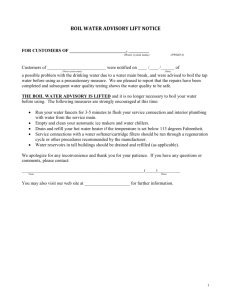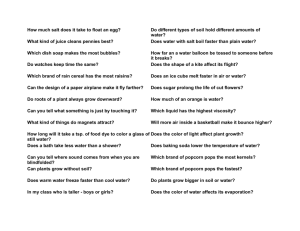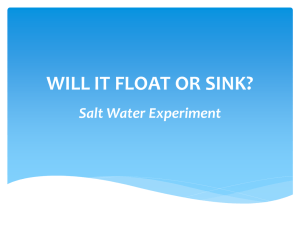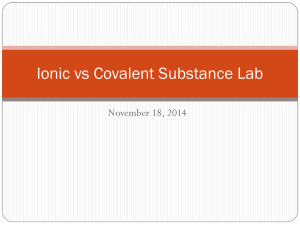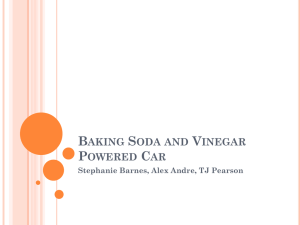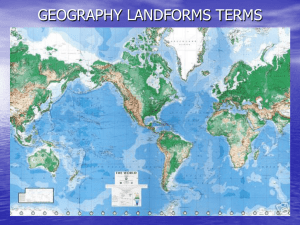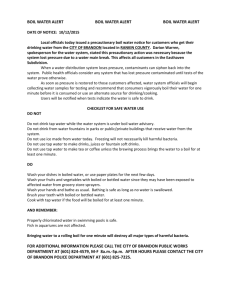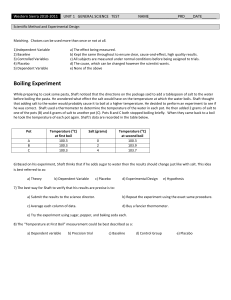Boiling Point Experiment: Salt vs. Sugar vs. Baking Soda
advertisement
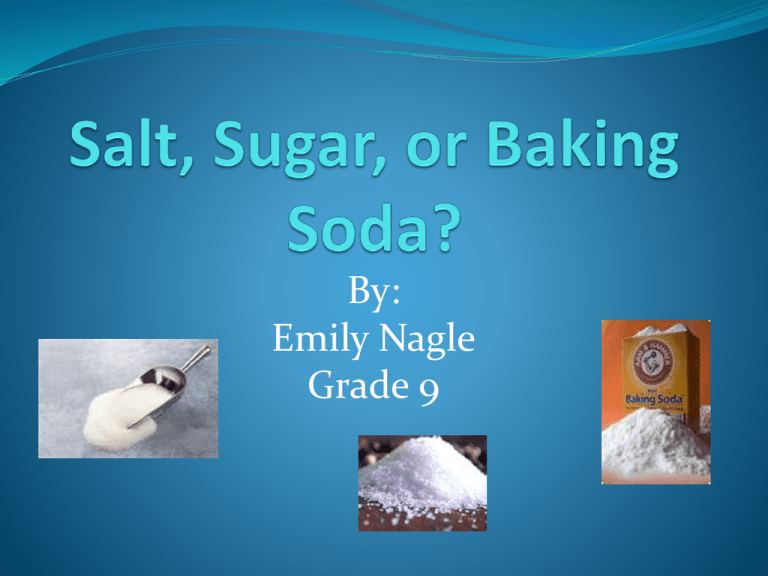
By: Emily Nagle Grade 9 Introduction Do you ever cook pasta? To me it seems like it takes the water forever to boil. That’s why I choose this for my experiment. To put the old myth to the test. Problem Does adding salt to water make it boil faster than other chemicals? Research Received information from the sites: http://wiki.answers.com and http://answers.yahoo.com/question They both stated that when salt is added to the water it makes the time to reach the boiling point faster These aren't trusted sites. Therefore I wanted to find out for my self if they were really true. Hypothesis Salt does make water boil faster than other solutes. Experimental Design Experiment Variable: Adding Solutes to water Experimental Design Experimental Group: Arm and Hammer baking soda Morton Iodized Salt Domino Sugar Experimental Design Control Group: Water without any solute. Preparing the Water Label each metal pot with the numbers 1-3 (1=salt, 2=sugar, 3= baking soda) Measure out 230 ml of the water into a measuring cup Pour the 230 ml of water into the pot Adding the solute Measure out 15 grams of salt, sugar, or baking soda and place it into the pot of water Take the temperature of the water with a thermometer and make sure the water starts at 21 degrees Celsius At the start and finish •Turn the dial for the right stove burner to High •Start the stopwatch as soon as the dial lands on the High heat •When the water reaches the 100 ⁰ C, turn off the stove Recording the Information Step 10: Stop the stopwatch Step 11: Record the time Cleaning up materials Clean up the materials safely and with caution Make sure that you check to see if the stove isn’t hot anymore When it’s not warm anymore, remove the pot and pour it into a sink. Wipe down the stove and put away materials you don’t need. Repeating Steps The next day at the same time, place a new numbered pot on the stove Repeat for 3 trails of each solute and for the control variable Experimental Design Control Variables: Amount of water used The starting water temperature The size of the cooking pots Brand of the dry ingredients used Amount of each dry ingredient added Time of day My Data: Times to Boiling Event: Water Salt Baking soda Sugar Trial 1 169 173 167 233 Trial 2 175 171 163 236 Trial 3 172 165 181 226 Average 172 170 170 232 * The time is in seconds* My Data: Trial Results * The time is in seconds* Conclusion My data does support my hypothesis that salt does make water boil faster than other methods. Next time I would… End the experiment when the water begins to boil, not at 100 c. Add more or less of the dry ingredient to the water so it would make the water boil faster. The amounts of solutes (salt and baking soda) used, only increased boil time by 1 percent. By: Emily Nagle Experimental Procedure Step 1: Gather materials Deer Park bottled water Stopwatch Morton Iodized salt Domino sugar Arm and hammer baking soda 3 round metal cooking pots each 16.5 centimeters inside Oven with stove top (electric/newer model) Pencil or pen Experimental Procedure Step 1: Gather materials continued.. Liquid measuring device (holds at least 230 ml) Standard set of measuring spoons (holds at least 15 grams) Pampered Chief digital thermometer My Sources http://answers.yahoo.com/question/index?qid=20090 718115652AAnvaHh My grandmother, Jean Beery Home Economics teacher, Mrs. O’Connor http://wiki.answers.com/Q/Does_adding_salt_to_wat er_make_it_boil_faster Pasta Recipes (a cooking book)
